Related Research Articles

The economy of Bulgaria functions on the principles of the free market, having a large private sector and a smaller public one. Bulgaria is an industrialised high-income country according to the World Bank, and is a member of the European Union (EU), the World Trade Organization (WTO), the Organization for Security and Co-operation in Europe (OSCE) and the Organization of the Black Sea Economic Cooperation (BSEC). The Bulgarian economy has experienced significant growth (538%), starting from $13.15 billion and reaching estimated gross domestic product (GDP) of $86 billion or $203 billion, GDP per capita of $31,148, average gross monthly salary of 1,676 leva, and average net monthly salary of $1,838 (2021). The national currency is the lev, pegged to the euro at a rate of 1.95583 leva for 1 euro. The lev is the strongest and most stable currency in Eastern Europe.
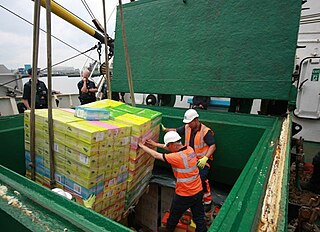
Smuggling is the illegal transportation of objects, substances, information or people, such as out of a house or buildings, into a prison, or across an international border, in violation of applicable laws or other regulations.
The Navigation Acts, or more broadly the Acts of Trade and Navigation, was a long series of English laws that developed, promoted, and regulated English ships, shipping, trade, and commerce between other countries and with its own colonies. The laws also regulated England's fisheries and restricted foreigners' participation in its colonial trade. While based on earlier precedents, they were first enacted in 1651 under the Commonwealth. The system was reenacted and broadened with the restoration by the Act of 1660, and further developed and tightened by the Navigation Acts of 1663, 1673, and 1696. Upon this basis during the 18th century, the Acts were modified by subsequent amendments, changes, and the addition of enforcement mechanisms and staff. Additionally, a major change in the very purpose of the Acts in the 1760s – that of generating a colonial revenue, rather than only regulating the Empire's trade – would help lead to major rebellions, and significant changes in the implementation of the Acts themselves. The Acts generally prohibited the use of foreign ships, required the employment of English and colonial mariners for 75% of the crews, including East India Company ships. The Acts prohibited colonies from exporting specific, enumerated, products to countries other than Britain and those countries' colonies, and mandated that imports be sourced only through Britain. Overall, the Acts formed the basis for English British overseas trade for nearly 200 years, but with the development and gradual acceptance of free trade, the Acts were eventually repealed in 1849. The laws reflected the European economic theory of mercantilism which sought to keep all the benefits of trade inside their respective Empires, and to minimize the loss of gold and silver, or profits, to foreigners through purchases and trade. The system would develop with the colonies supplying raw materials for British industry, and in exchange for this guaranteed market, the colonies would purchase manufactured goods from or through Britain.
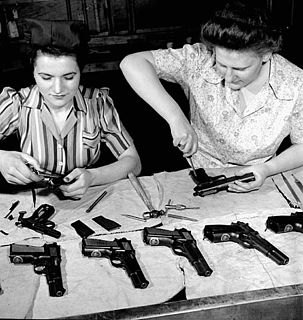
The arms industry, also known as the arms trade, is a global industry which manufactures and sells weapons and military technology. It consists of a commercial industry involved in the research and development, engineering, production, and servicing of military material, equipment, and facilities. Arms-producing companies, also referred to as arms dealers, or as the military industry, produce arms for the armed forces of states and for civilians. Departments of government also operate in the arms industry, buying and selling weapons, munitions and other military items. An arsenal is a place where arms and ammunition - whether privately or publicly owned - are made, maintained and repaired, stored, or issued, in any combination. Products of the arms industry include guns, artillery, ammunition, missiles, military aircraft, military vehicles, ships, electronic systems, night-vision devices, holographic weapon sights, laser rangefinders, laser sights, hand grenades, landmines and more. The arms industry also provides other logistical and operational support.
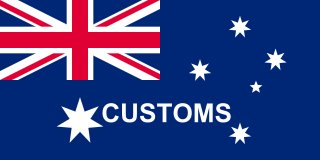
The Australian Customs and Border Protection Service was an Australian federal government agency responsible for managing the security and integrity of the Australian border and facilitating the movement of legitimate international travelers and goods, whilst protecting the safety, security and commercial interests of Australians. It was headquartered in Canberra and employed over 5,800 people around Australia and overseas.

The Customs and Excise Department (C&ED) is a government agency responsible for the protection of the Hong Kong Special Administrative Region against smuggling; the protection and collection of revenue on dutiable goods on behalf of the Hong Kong Government; the detection and deterrence of drug trafficking and abuse of controlled drugs; the protection of intellectual property rights; the protection of consumer interests; and the protection and facilitation of legitimate trade and upholding Hong Kong's trading integrity.
Armimex was a state–owned Bulgarian company with a full license for export, import and re–export of all types of weapons, ammunition and special products for the army and the police.

The economic history of the Republic of Turkey may be studied according to sub-periods signified with major changes in economic policy:
- 1923–1929, when development policy emphasised private accumulation;
- 1929–1945, when development policy emphasised state accumulation in a period of global crises;
- 1950–1980, a period of state guided industrialisation based on import substituting protectionism;
- 1980 onwards, opening of the Turkish economy to liberal trade in goods, services and financial market transactions.
Taxation in Iran is levied and collected by the Iranian National Tax Administration under the Ministry of Finance and Economic Affairs of the Government of Iran. In 2008, about 55% of the government's budget came from oil and natural gas revenues, the rest from taxes and fees. An estimated 50% of Iran's GDP was exempt from taxes in FY 2004. There are virtually millions of people who do not pay taxes in Iran and hence operate outside the formal economy. The fiscal year begins on March 21 and ends on March 20 of the next year.
Trade is a key factor of the economy of China. In the three decades following the formation of the Communist Chinese state in 1949, China's trade institutions at first developed into a partially modern but somewhat inefficient system. The drive to modernize the economy that began in 1978 required a sharp acceleration in commodity flows and greatly improved efficiency in economic transactions. In the ensuing years economic reforms were adopted by the government to develop a socialist market economy. This type of economy combined central planning with market mechanisms. The changes resulted in the decentralization and expansion of domestic and foreign trade institutions, as well as a greatly enlarged role for free market in the distribution of goods, and a prominent role for foreign trade and investment in economic development.
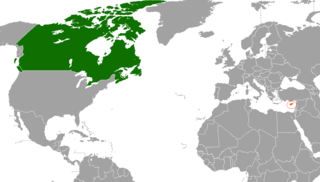
Canadian–Cypriot relations are foreign relations between Canada and Cyprus. Canadian bilateral political relations with Cyprus stemmed initially from Cypriot Commonwealth membership at independence in 1960. These relations quickly expanded in 1964 when Canada became a major troop contributor to United Nations Peacekeeping Force in Cyprus. The participation lasted for the next 29 years, during which 50,000 Canadian soldiers served and 28 were killed. In large measure Canadian relations with Cyprus continue to revolve around support for the ongoing efforts of the UN, G8 and others to resolve the island's divided status. Contacts with Cyprus on other issues also take place in international organizations such as the UN, the Organization for Security and Co-operation in Europe and the Commonwealth of Nations.
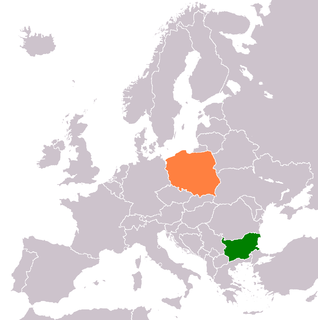
Bulgarian-Polish relations are foreign relations between Bulgaria and Poland. The countries established diplomatic relations in 1918 soon after Poland regained independence. Both countries are full members of the European Union, NATO, Bucharest Nine and OSCE.
Hüseyin Baybaşin is a Kurdish drug trafficker. He is currently serving life sentence in the Netherlands convicted of murder, drug smuggling and other charges.

Bulgaria–Uzbekistan relations are foreign relations between Bulgaria and Uzbekistan. Both countries established diplomatic relations on September 12, 1992. Bulgaria has an embassy in Tashkent. Uzbekistan is represented in Bulgaria through a non resident ambassador based in Tashkent Both countries are full members of the Organization for Security and Co-operation in Europe.

Bulgaria and Sudan established diplomatic relations on July 1, 1956. In 1967, Bulgaria sent the first Bulgarian ambassador to Khartoum. The activities of the Bulgarian embassy in Khartoum were terminated in April 1990, and later reestablished in March, 2005. In 2006 the General Consulate of the Sudan, in Sofia, Bulgaria was upgraded to the rank of embassy.

The Victoria Affair was a military operation conducted by the Israel Defense Forces (IDF) in March 2011 in which the Israeli Navy intercepted the vessel Victoria on the international waters in the Mediterranean, and discovered concealed weapons which, according to the IDF, were destined for Palestinian militant organizations in the Gaza Strip. The vessel was found to be carrying approximately 50 tons of weapons, including C-704 anti-ship missiles, rocket launchers, radar systems, mortar shells and rifle ammunition.

The alleged illicit activities of the North Korean state include manufacture and sale of illegal drugs, the manufacture and sale of counterfeit consumer goods, human trafficking, arms trafficking, wildlife trafficking, counterfeiting currency, terrorism, and other areas. It is alleged many of these activities are undertaken at the direction and under the control of the North Korean government and the ruling Workers' Party of Korea, with their proceeds going towards advancing the country's nuclear and conventional arms production, funding the lifestyles of the country's elite, and propping up the North Korean economy.
A number of countries and international bodies have imposed sanctions against North Korea. Currently, many sanctions are concerned with North Korea's nuclear weapons program and were imposed after its first nuclear test in 2006.
Trading in the Safavid era was carried out in the form of exchanging goods with goods and exchanging goods with cash.
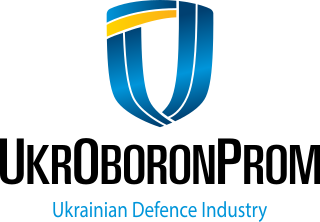
The defense industry of Ukraine is a strategically important sector and a large employer in Ukraine. After working for several decades mostly for the arms export markets, in 2014 it has moved significantly into increased Ukrainian military procurement since the start of the war in Donbas.
References
- ↑ The Time Of The Assassins, Claire Sterling, New York City, Holt, Rinehart, Winston, 1985, pp. 84–86.
- ↑ Kintex at Novinite.com, internet article, retrieved on August 24, 2009.
- ↑ Bulgarian Defensive Industry Association Archived 2009-12-14 at the Wayback Machine , internet article, retrieved on August 24, 2009.